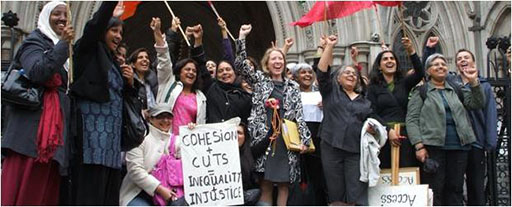9 Women, asylum and immigration
Women face particular issues as migrants, asylum seekers and refugees. In the next activity, Meena Patel, of Southall Black Sisters (SBS), discusses some of the challenges that women can face in relation to the immigration system. She talks about the work of SBS, a campaigning and voluntary organisation working nationally with black and ethnic minority women. She focuses on the role of social workers in relation to law and practice in cases involving domestic violence, immigration and where there is no recourse to public funds (NRPF), especially for those on spousal visas. In addition, she considers the needs of women experiencing immigration, asylum and NRPF problems with other forms of gender-based violence, including sexual violence and harmful practices such as forced marriage, female genital mutilation and so-called ‘honour’ based violence.

Meena explores the definition of vulnerability, and how this can be applied to women and children seeking help from social services, and who are in need of housing and financial support to prevent destitution when leaving an abusive relationship. In particular, she explains how and why social workers can, and should, house and support women and children together – rather than simply place children into care, which is the practice of some local authorities.
Activity 6 Interview with Meena Patel, Southall Black Sisters
As you listen to the audio featuring Meena Patel, note down your thoughts on the questions that follow.
Please note, this audio is approximately 21 minutes long.
Transcript: Audio 16
1. What particular issues do women face as migrants, refugees and asylum seekers?
2. How can social workers support women who are experiencing violence and abuse?
3. Why has SBS campaigned to get various laws, including that on spousal visas, changed?
Discussion
Meena discusses how the law can be used to support women and why SBS has campaigned successfully for legal change – for example, on spousal visas. Effective early intervention by social workers can help to prevent the escalation of abuse and harm both to vulnerable women and their children, and reduce the possibility of litigation where they fail in their duty of care.
Also, as Meena outlines, faced with financial constraints and legal limitations, social workers need to look at other sources of help to which they can refer women for legal, housing and welfare assistance and support, such as women’s domestic violence housing, support and advocacy services, and immigration lawyers or advisers.
Additionally, the needs of women with no dependent children can be met and, as some local authorities apply narrow interpretations of the law, social workers can help to ensure that these women can be defined as ‘vulnerable’ adults, by considering a range of factors, such as pregnancy, age, health and social circumstances. This is especially important in a context where migrant women face multiple problems and forms of discrimination. For instance, Asian women are three times more likely than women generally to commit suicide due to undiagnosed mental health problems caused by abuse. They also have higher rates of self-harm and suicide ideation, which can be compounded by an insecure immigration status or barriers to accessing support and protection because of the NRPF restriction (Siddiqui and Patel, 2010).
Meena discusses the importance of the support group run by SBS and the role of peer support in supporting women through challenging circumstances. Social support and building social networks is an important facet of support.
One source of information for women and girls escaping violence with insecure immigration status is Rights of Women.
